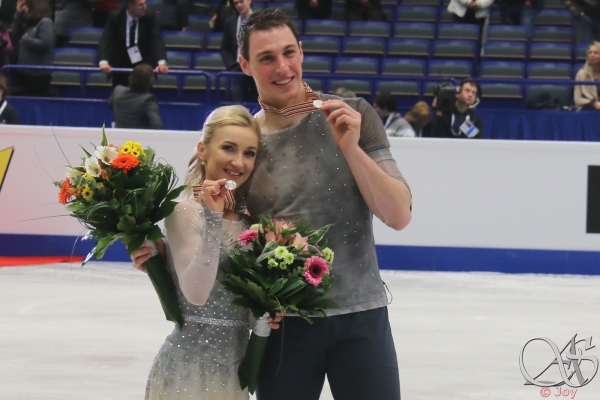Aljona Savchenko and Bruno Massot: fighters sharing emotions and fun
March 2, 2017
By Titanilla Bőd (Új Szó)
Photos © Mireille Geurts and Joy
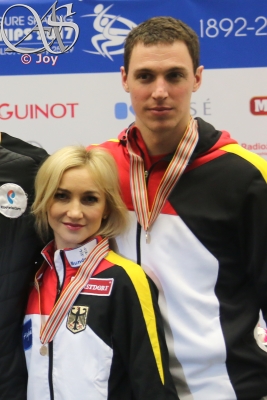 Aljona Savchenko's technical perfection and precision was never doubted. However, with her new partner, Bruno Massot, she also revealed a fun, easygoing side of her personality. During the European Championships in Ostrava the German pair grabbed the silver medal with two memorable programs, and on the next day they had time for an interview. It was a long chat full of laughter and inspiring thoughts.
Aljona Savchenko's technical perfection and precision was never doubted. However, with her new partner, Bruno Massot, she also revealed a fun, easygoing side of her personality. During the European Championships in Ostrava the German pair grabbed the silver medal with two memorable programs, and on the next day they had time for an interview. It was a long chat full of laughter and inspiring thoughts.
After the free skate you said that this silver is like gold for you. What do you mean by that?
Aljona: For us, after my bad injury and no skating for a long time, we were not well prepared.
Bruno: There was a long period with no skating for Aljona. I was still skating, but alone, which was a bit boring. Then she came back on the ice, but it wasn't possible to do everything, so it was very difficult preparing for Europeans. I was sick over a week at the beginning of the month, after that she got sick... Still, we came here to perform well and we did. After this strange preparation the silver is like gold for us, because it was just magic on the ice!
It definitely was, not only the audience, but also you got very emotional at the end of your routine. A friend of mine noted: "Aljona has so many medals from major competitions, and she starts crying because she had a good skate at Europeans!"
Aljona: Every medal has a story, and for me it's always something special. That's why I stay in competition - because I love it. If I have the opportunity to compete, why not? Why not be happy, why not make people happy? To give happiness and receive happiness from people is amazing. During shows you never feel this way. At a competition you know people come to watch you fight; there is a strong atmosphere. It's something really special. This is what I love. I love to compete and fight; it gives me more energy and happiness in life.
In the short program you fell in the step sequence. I would say that a few years ago you would have been very angry after such a mistake, but in Ostrava you just shrugged your shoulders and had a good laugh about it. You seem much more easygoing now. Do you have a different approach to skating now than in the past? 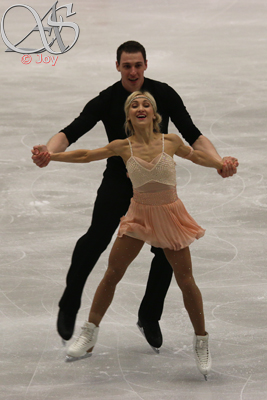
Aljona: On the whole I'm much happier. I think my life has changed because I have an amazing husband. He gives me positive energy, which I can share with people. Some athletes have everything on the ice, but they have nothing at home. Strong personalities have difficulties finding the other side of themselves. And now, I feel I have everything and I don't need to worry. These nice things that I do, I share with my "second half". That's why it's changed my personal life and my skating life. I enjoy more, because I have more fun. I have a lot of fun with Bruno as well, he is a very open person and we can talk about everything, which I never felt before. I think all this gives me huge support. During the short program I was really happy; it felt great to skate again and have fun. I was feeling so good, maybe too good! And I was relaxed. I remember at the beginning of the step sequence I was like: "Oh, it's going cool! Fun!" And then... boom! "Shit. Shit, shit, shit! Keep going, there is a medal!" You know, when you suffer from shock you wake up... I was just doing what I had to. It was a funny fall, my legs pointing to the ceiling...
Bruno: In slow motion it looks even funnier. It could be part of the program in a show! We will think about it.
You have a fun short program, while your free skating is deeply emotional. Which one do you prefer?
Bruno: I don't know. In one program we have lots of fun, in the other one we share a lot of emotions. These are the two biggest parts of figure skating: to share something and have fun. I don't have a preference. We feel really good about both programs, we just like what we share.
In your free program you skate to Lighthouse by Patrick Watson. How did you find this music?
Bruno: Our coach, Jean-Francois Ballester, knows this singer since a few years back, and I also listen to his music. Jean-Francois suggested this for a program already last year, but to tell the truth, Aljona was not very happy about it then. But this year she liked it, so we decided to skate to it, and we have no regrets. 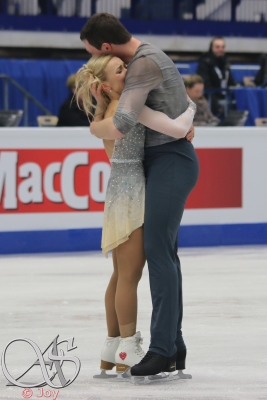
Isn't it mentally exhausting to put out all those emotions during this free program? You move many people with your routine; they cry watching you.
Bruno: That's what we try to share. It's exactly the emotion we want to see at the end of our program, and that's what we got here. In the closing position, Aljona was already crying. It was one of the best moments in my career.
Did you have any thoughts at that moment, or did you just let the emotions flow through you?
Aljona and Bruno in total sync: I don't remember!
Bruno: Everyone asks us what we felt and thought at certain moments, but you can't really remember. There are a lot of emotions, your mind is blank.
Aljona: Sometimes you don't remember how you skated, if you did an element or not. Because you are so concentrated and put everything into your performance, and after that you just forget everything.
Bruno: There is just one thing you'll always remember - a little fall in the step sequence...
Aljona (laughs): Thank you!
At the press conference you explained that this music, Lighthouse, meant the light at the end of the tunnel during your hard times. How did you manage to overcome all the difficulties?
Aljona: The strength comes when you know why you push yourself. We know why we practice everyday, why we spend our lives skating. I've been skating for 30 years now. If I'm injured or sick I just remember why I'm doing this and what motivates me. I just love this! And when you love something, you look forward to something new and special, and this gives you more and more energy every day. You might feel bad, but you go on the ice, and you forget all the bad things! This gives us strength and motivation to continue. The music we have this season also helps a lot.
Bruno: And when you have such a week [like at Europeans in Ostrava], you just want more of it. More moments like this, more programs like this, more medals, more results. You just want to relive this moment every day. This is motivation. You have one, then you want 10.
Aljona: It's never enough! A sports career is so short. Such moments are also very short. Some people finish their career after one big victory, and nobody speaks about them again. They are just forgotten. They start to do something else, but maybe after 10 years they will realize: "I wish I could do it again!" But by then it's over. We want to experience these amazing moments for as long as we can. It really is magic.
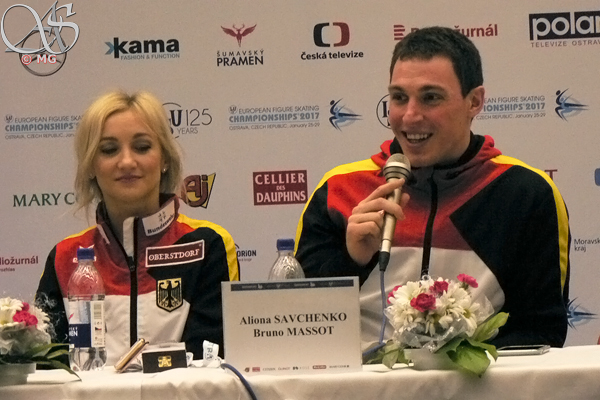
Aljona won many medals with her previous partner, Robin Szolkowy. But for you, Bruno, the medal collection starts to grow only now, with Aljona. How do you feel about this partnership? You had to wait almost two years to be released by the French federation...
Bruno: There was a very long period when we couldn't compete, only practice. It was a hard period. When we won our first competition in Tallinn, and I realized what potential we had, I thought: "This is a new book, and I think we can write a beautiful story." I remember thinking: "Let's go! Just give it everything you've got. You just have achieved what you dreamt of, so keep going and fight for it."
When you started skating together, did you have any doubts that you might not live up to Aljona's expectations?
Bruno: It was very hard work for me. If I didn't show the potential, she wouldn't choose me. So I tried to prove to myself and everyone that I was able to be at the level she was, and even better. This was my objective. At the beginning when everyone was comparing me to Robin, I was like: "No. Don't compare me to Robin. I want to be better."
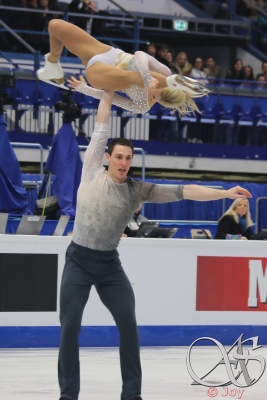 Last year in Bratislava (Europeans) you missed a lift and you were just devastated in the kiss & cry.
Last year in Bratislava (Europeans) you missed a lift and you were just devastated in the kiss & cry.
Bruno: It was horrible, that free program was just horrible. I didn't have the same feelings after the free program last year as this year! The medal is the same, but this year it was much, much better.
Aljona, do you still feel some pain after your injury?
Aljona: I still feel a little pain, but I see a physiotherapist and I hope that in a couple of weeks it will be much better.
You suffered the injury at the TEB after your throw triple Axel. And you skated through the whole program after that! A torn ankle ligament is very painful; many people can't even stand up after that. How did you manage to finish the program?
Aljona: When I landed, I felt a crack and knew something bad had happened. But I just thought: "There is a medal, you can still win!" And you are not alone on the ice, in such moments that keeps you going. If you were alone you might just throw in the towel, but there is that other half of the pair, who is also competing. So you can't just stop and say: I quit. It's a big responsibility [being 2 on the ice]. And when the adrenaline flows, you don't feel the pain. I kept thinking during the lift when to tell Bruno if I could do the quad or not. Normally it's planned that I do a quad [Salchow at the end of the program]. I was testing my foot during lifts (shows what kind of ankle movements she was doing), to see if I was okay to land the quad. And every time he put me down, I realized that I couldn't do it. I was so scared that I would suffer an even worse injury. So after the last lift I told him: "Triple!", but I don't think he heard me.
Bruno: I heard you say something. And because you never say anything, I guessed it meant triple.
Aljona: After those lifts I just felt as if my boot was really soft. I was thinking over and over: "Triple? Quad? Quad! Triple..." It's crazy, but it's true! I wasn't thinking about the elements I was actually doing, because I can do them with my eyes closed, I was only thinking about the quad.
So you usually don't talk to each other during the program?
Bruno: If we need to say something, we talk with our hands, 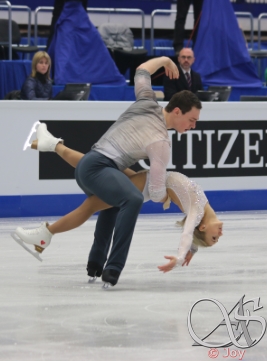 like if we need one more crossover.
like if we need one more crossover.
Aljona: And it's really hard to speak. The program is 4 minutes and 40 seconds, but it's like 10 kilometers of running. When you speak, you lose energy.
You said that you will practice the throw triple Axel and throw quad Salchow for the World Championships. What do you think, when will you be able to start with these elements again?
Aljona: We won't plan when exactly. When my foot is completely okay, we will start.
Bruno: We will take it step by step. There are still two months until Worlds; we have time. And because we already did those jumps, it will go pretty fast to get them back.
How hard is it to land a throw triple Axel or a throw quad Salchow?
Aljona: Of course it's hard, but it's not as hard as people think. I think many consider it a hard element because it's new, but everything is possible. Just think of single skaters. In some ways it's easier for them, because they jump all by themselves and they control everything. In pairs, if everything is going in perfect unison, it's easy. But any small mistake makes it harder. It's a risk. But we are athletes, we already take risks. We want to show something different.
For the guy, what's the difference between a throw triple and a throw quad?
Bruno: For me it's the same if it's single, double, triple or a quad. But I like to know [what she will jump], because it's important to control it. The technique has to be the same, so my moves are exactly the same. What is difficult for the man is the control of his energy; to really feel the rhythm and the speed. This is the hard part, because she can be slow or fast... We just have to feel each other, and when we do things go well.
Do you think this is the future of pairs skating, that more and more pairs will try to add difficult throw jumps?
Bruno: It's the same in all disciplines. In singles you now see five quads in a program, it's crazy! We have to push our discipline; we have to change figure skating. This is the future, and we all have to start doing this.
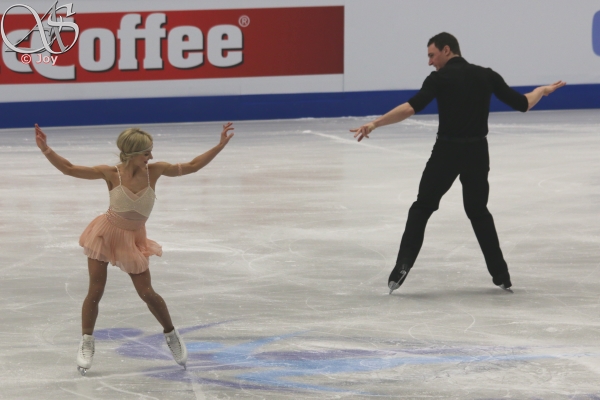
The last few years Europeans have had the pairs competing in the morning. Many skaters were very upset about it. In Ostrava they went back to the old schedule with pairs short on Wednesday evening, and the free on Thursday evening. The Pairs competition was the highlight of the whole week - was it because of this schedule change?
Bruno: Of course! When we have time to practice, time to relax, and by that I don't mean two or three hours on a bed in the skating lounge, we skate much better. We need time before our programs; we need to think about something else and control our stress and energy. I remember at one Europeans we had to skate after the banquet on Sunday morning. Just because of TV!
Aljona: But if they want nice performances from the athletes, they should make the schedule in favor of the athletes, not the TV broadcasts!
Bruno: Here in Ostrava we had a good schedule, and you could tell. The competition had a high level and everyone skated very well.
Aljona: Pairs skating is dangerous, and you simply can't do dangerous elements in practice at 5 am, to practice what we need to show at 10 am - it's not possible! Your body needs to recover; we are not robots, we are human!
Bruno: Your body is simply not awake that early. We need time for these kinds of elements.
There are rumors that the Olympics next year will schedule all figure skating competitions in the 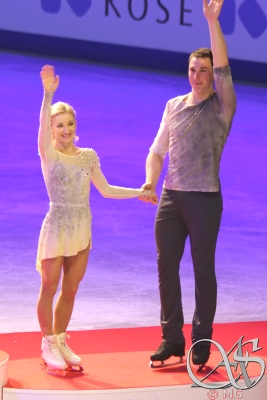 morning because that is prime time for US television.
morning because that is prime time for US television.
Aljona: That is stupid!
Bruno: Completely stupid. Olympic Games aren't made for TV. Of course, we need to be ready for every situation, but this is not a small competition in a small city, but the Olympic Games! And Olympic Games are for athletes.
What time do you normally practice?
Aljona: Warm-up at 10, that's the earliest. We are on the ice by 11, train until noon, and then have another practice in the evening, at 8 or 9 pm.
To change the subject: what is the quality that you like the most in your partner, and what is one that annoys you?
Aljona (laughs): *Cough, cough* Should I answer this first?
Bruno: I will mention the example from Paris. She hurt herself on the Axel, but I saw nothing until the end of the program. She was in pain, but I didn't see it. That's what I call a fighter, she's amazing!
And is there anything that annoys you?
Bruno: She is a fighter and this can be annoying too at times. Some days, when you are not in the mood or are tired, it's hard to follow her.
Aljona: He is a fighter, too. And sometimes it's also annoying.
Bruno: Come on; find another answer; that's mine!
Aljona: See? It's always like this (laughs)! But, well... it can be really good, or it can be really bad (laughs even louder). But if you want to reach something, it cannot be perfect everyday.
Bruno: We fight for the same things, but we can't be perfect every time. However, we can reach our goals.
Do you argue sometimes?
Aljona: All people argue sometimes.
Bruno: Sometimes we don't feel like practicing, but we have to anyway. But in 10 minutes or so we've forgotten about it and we feel better. Okay, sometimes it's more like half an hour (smiles), but we come back anyway.
You both seem very inspired by each other. Is this true?
Bruno: It's like that. We have the same goals, and we always want something new. We share our ideas. Sometimes we make a small mistake on a lift but realize that this can be cool, and we found a new lift! We share everything, and we push each other in the same direction.
You said that you have the same goals. So what is your ultimate goal?
Bruno: Two words: Win everything. Or: Gold everywhere. It's also two words. It's simple.
